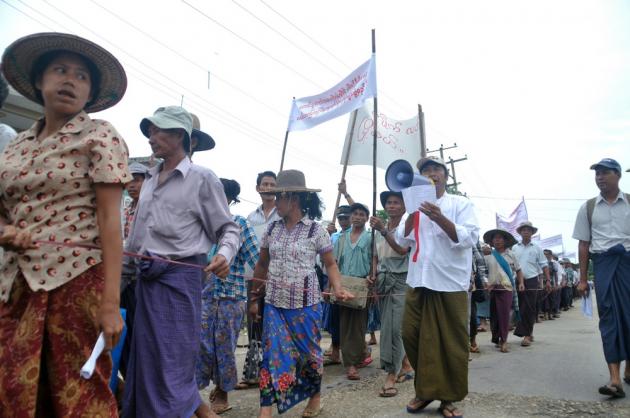Land grabbing top the list of rights violations

Farmers turn to human rights commission to address land disputes with government and military
The Myanmar National Human Rights Commission has received about 6,000 complaints since its inception in 2011, and most of them involve land confiscation by force.
“Most of the complaints are about land grabbing, as the complainants want to reclaim their land from the government and the military,” said Win Mya, the commission’s chairman. “Others involve businessmen alleged to have unscrupulously secured land.”
President Thein Sein established the commission on September 5, 2011, with the main objectives to promote and safeguard constitutional rights. On its website (http://www.mnhrc.org.mm/en/573/complaints/), the body said that complaints of fundamental rights violations are welcomed and if the alleged violations are proved true, it will take further steps to rectify them.
All received complaints have been scrutinised and relevant authorities were notified, and government agencies have submitted their defence to some complaints, said the chairman.
Land is a vital possession for farmers in Myanmar, which constitute around 65 per cent of population. Over the past few years – with a relaxation of bans on public protests – many farmers have taken to the streets to publicly voice their complaints. Some brought their cases to courts, but most of them failed to win. Many accuse government agencies or the military of seizing their land and depriving them of the rights to farm it. Some say their land was grabbed then allocated to other farmers.
Last week, the government granted permission for a protest against land grabbing in Maubin in Ayeyawady Region, which drew about 1,200 farmers. It was billed as the largest farmers’ protest in history. In January, around 500 farmers staged a similar protest in Yangon.
“Farmland was not confiscated in accordance with the law, but officials kept repeating that it was done ‘in accordance with the law’ when land was seized. Actually, the farmers are not educated and they don't know the laws. But we have seen the Farmland Management Committee using this information to delay the return of [confiscated] farmland,” said farmer advocate Kyi Lwin while joining the protest.
The Assistance Association for Political Prisoners said more than a hundred farmers had been detained for protesting for the return of grabbed land since the beginning of the year. On August 19, Sein Than was convicted by a Yangon district court for a four-month jail term with hard labour for leading a protest in November against the military’s confiscation of farmland in the 1990s.
The Parliamentary Land Investigation Commission released a report at the end of February uncovering 745 cases of land seizure. According to the report, the army, local government authorities and private companies have grabbed more than 500,000 acres of land.
Voices are growing louder for Thein Sein to step in.
Last month, the president called on state and regional officials to keep a close watch on land disputes – in line with the law and standing orders, warning that moves to grab land from farmers might invite bribery and other illegal acts.
In March, vice president Nyan Htun called for quicker action on returning military-seized lands to its original owners.
Currently, the Defence Ministry has handed back over 200,000 acres of land to farmers, but only half of it was returned to original owners. All land plots located in Yangon Region and Kayin State have been returned.
It plans to return more land in other areas: 230 acres in Nay Pyi Taw Council Area; 16,500 in Kachin State; 1,500 in Kayah State, 600 in Chin State; 26,300 in Sagaing Region; 2,300 in Taninthayi Region; 9,000 in Bago Region; 3,500 in Magway Region; 3,300 in Mandalay Region; 950 in Mon State; 6,900 in Rakhine State; 32,000 in Shan State; and 7,000 in Ayeyawady Region.
It remains unclear how MNHRC can facilitate the process. On March 28, the Union Parliament passed a new law to empower the commission. It demands all ministries to address forwarded complaints within 30 days.
Win Mya admitted that more farmers are turning to rights commission can solve land disputes as it has no direct power on the courts.
“The commission is a buffer between people and the authorities. If bringing their cases to court, they will have to face expensive costs and the complicated process. That’s why they become dependent on our commission.”
The commission is more active in the political arena, vehemently urging the government to pardon political prisoners. Since 2011, there have been 15 general amnesties of prisoners: 1,181 dissidents and 22,238 criminals were released. Only a handful of the dissidents received pardons. The rest still have criminal records.
RELATED
